Updated: November 23, 2022
This article was originally written in 2014. I wrote it because there was a lot of confusion in regards to Google's stance on guest posting for links. I did not anticipate that EIGHT YEARS later, we would still be having the same discussion. Is guest posting for links a good idea? I've updated this article with more recent information.
If you are writing articles so that you can get them published on other people's site in order to build a link to your website, you are breaking Google's guidelines.
Then why do so many people advocate for guest posting for links?
Do you guest post for SEO reasons?
— Marie Haynes (@Marie_Haynes) November 17, 2022
Some will say that it still works for them. I think that in some cases, if you are able to get guest posts published in truly authoritative places, this can contribute to your E-A-T and help Google understand that your name and your content is recognized by experts in your field. This kind of guest post has many benefits beyond the PageRank that might pass through a link. (And it's worth noting here that how PageRank works has changed a lot over the years.)
For example, if I wrote a guest post for an authoritative SEO publication, I'd get excellent brand exposure and perhaps gain clients or sell products. An authoritative publication is going to be very strict with their linking policy. I suspect that Google's algorithms can tell that a link from Search Engine Land is more likely to represent an expert level vote for your site or its content than a link in a guest blog on a site no one will ever read.
No matter how you slice it, if your primary reason for guest posting is to build links, you're breaking Google's spam policies.

In July of 2021, Google ran an update to their link spam system specifically designed to make it so that those who guest posted specifically for links would see no benefit. They make it really clear that guest posting for links is a bad idea.
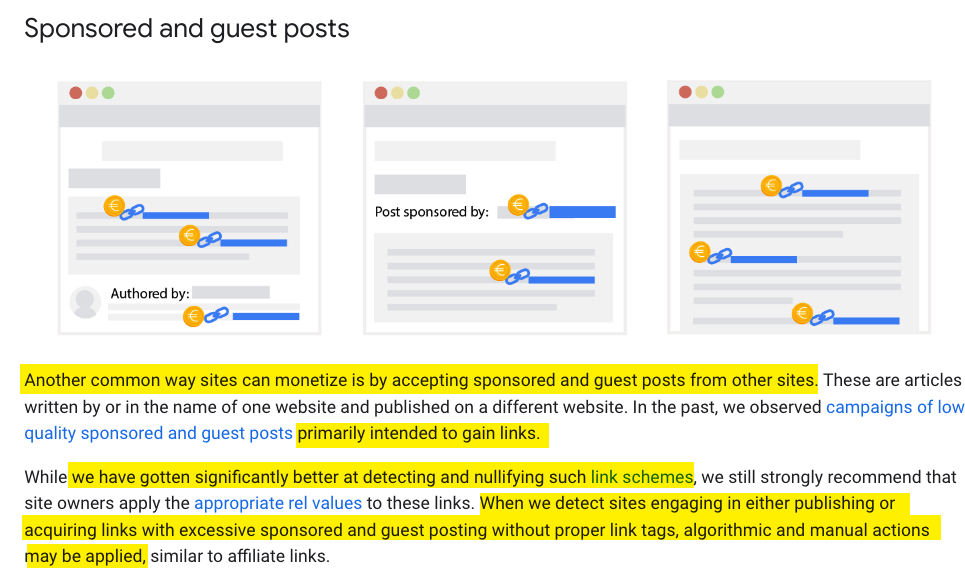
"When we detect sites engaging in either publishing or acquiring links with excessive sponsored and guest posting without proper link tags, algorithmic and manual actions may be applied."
While not every site that guest posted for links was hit by the July 2021 link spam update, here is a site I reviewed recently. They had guest posted in the past for links. This is a pattern I've seen in many sites.

We don't know whether the decline seen following the July link spam update was due to Google nullifying the PageRank benefit that previously flowed through guest post links to this site, or perhaps Google placed a classifier on the site to label it as one that participates in spam? Most likely the former is the case. Google can flag an entire site as spam as happened to many in the October core update. This can make it impossible to rank for anything. But I believe that for most sites that have been doing some guest posting, the worst that happens is that Google stopped sending PageRank through those links.
Why do people guest post even though it's against Google's guidelines?
I put myself in the shoes of a new business owner who is doing searches, trying to learn how to rank my website on Google. Most of the guides to SEO that are available tell us that guest posting can be effective, you just need to be careful not to overdo it. Some, especially the sites that sell guest posting, tell you that as long as you've got high quality articles and don't link back with keywords as anchor text, you'll see great ranking benefits from with guest post links. And then there are others that say that guest posting goes against Google's guidelines and isn't a great way to build links.
Which is right?
I did a search that I felt this business owner might do.
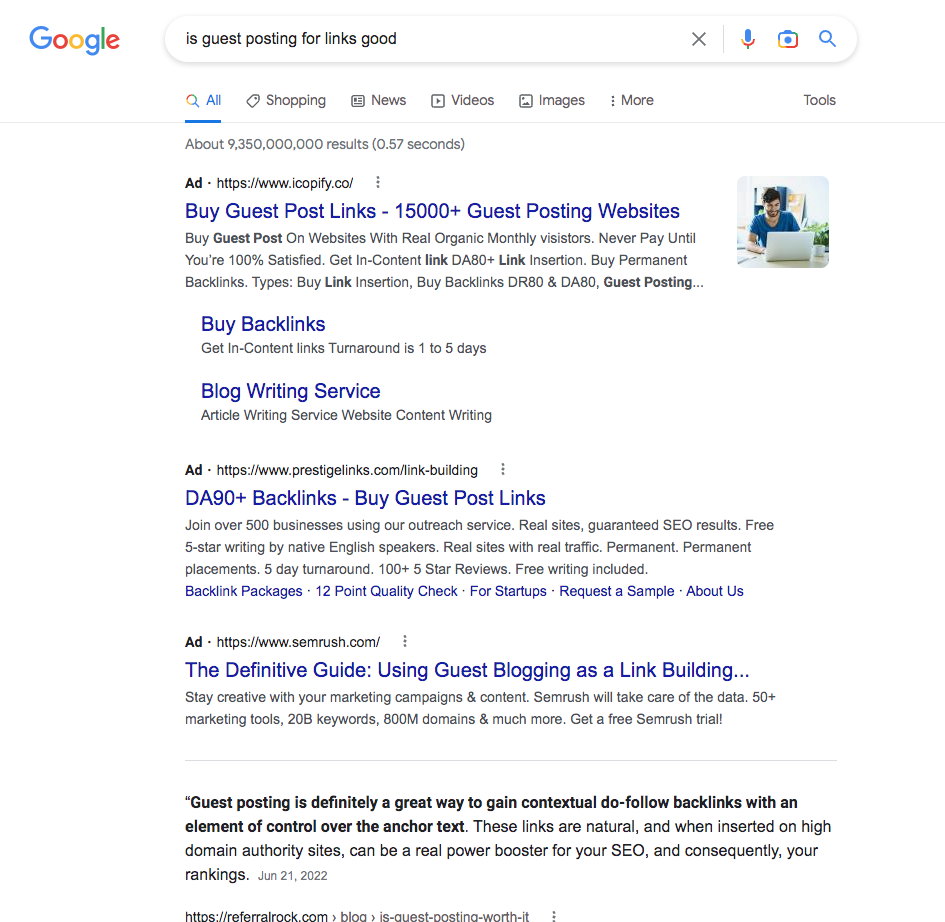
I mean...if a search on Google is telling me that guest posting is a good way to gain links to my site and improve my SEO, then why would I think otherwise?
All of the SEO advice that exists online exists because we've created an echo chamber. The folks who sell guest posting services will promote the narrative that guest posting is a good way to build links. The SEOs who abide by Google's guidelines and do not condone guest posting are unlikely to spend what little time they have for content creation on writing articles explaining why guest posting for links is a bad idea. (I mean other than this post, of course but this is 8 years old!)
As a result, it is hard for a website owner to know what it really takes to rank well on Google.
(By the way, this is probably a good place to mention that I'll soon be releasing a course to help you understand Google's algorithms and determine what needs to be done in order to improve your search presence in 2023 and beyond.
Most SEOs who have used guest posting as a link building tactic are not black hat SEOs with some nefarious purpose. Many are well meaning, hard working people, trying to learn how to make money online. If you have guest posted for links, your main concern right now should not be whether or not these links are hurting you. It should be working on determining how to make the type of content Google wants to rank.
Before we get to the original article, I'd like to leave you with a few thoughts and recommended resources.
If you are concerned about a history of guest posting
If you have guest posted for links a few times in the past, most likely, Google's algorithms are just ignoring those links. They're likely not hurting you.
If you have guest posted on websites where searchers legitimately read your content and possibly even clicked on your links and engaged with your site, these are not the type of link Google considers spam.
If you have guest posted for links as a main strategy for link building, then I believe you should consider using Google's disavow tool.
Google recently told us about their many different ranking systems. One of these is called a "spam detection system". It's powered by SpamBrain, powerful AI. In the October spam update, I noticed that the majority of the sites that were devastated by this update had a backlink profile consisting of links that were created just for SEO reasons. The few sites that did not have unnatural links had other issues identified in the spam policies such as thin affiliate content or user generated spam.
If SpamBrain identifies that your site is actively trying to manipulate Google in ways that break their guidelines, it will cause your site to not be suppressed in Google Search. You can lift this suppression by removing the spam. This means significantly beefing up affiliate content, removing user generated spam, and most likely, disavowing links that were made for SEO purposes.
Google's spam guidelines have remained essentially the same for many years. What has changed is their ability to identify spam.
Here are some resources that may help:
Google's July 2021 link spam update announcement discussing guest post links
My recommendations on disavowing. However, I have not updated these since the October link spam update. I am now starting to advise disavowing once again if you have heavily used tactics that go against Google's guidelines.
My podcast episode on the October spam update. I also have shared a lot on spam over the years on my Youtube channel.
My newsletter. I've been writing on spam, link spam, and Google's policies for a decade. You'll have a lot of back issues to read.
My book on link auditing and disavowing - A few years old but very relevant. Will help you audit your links, decide what to disavow and file the disavow.
Google's advice on creating helpful content
My book on evaluating your site like a quality rater - Two years old but still excellent. Teaches you how to assess E-A-T like a quality rater and improve the quality of your site in ways that Google wants to reward.
And also, I've got a course coming out soon to help those who want to learn how to optimize your site and its content in ways that truly will move the needle.
Original article (written in 2014) starts here
Recently there has been a lot of confusion surrounding guest posting and whether or not links from guest posts are all to be considered unnatural. Rand Fishkin stirred up a good debate when he published an article called “Dear Google, Links from YouMoz Don’t Violate Your Quality Guidelines.” He wrote the article because a penalized site owner had been given a link from a YouMoz guest post as an example of an unnatural link on a failed reconsideration request. So, does this mean that all guest post links are unnatural? Does this mean that if you have guest blogged on authority sites that you are in danger of getting penalized? I don’t think anyone can say with 100% certainty what is and isn’t safe, but what I would like to do in this article is articulate what Google has said and done in regards to guest posting and hopefully clear up some of the confusion.
John Mueller’s Advice in Webmaster Central Hangouts
Google employee John Mueller regularly runs hangouts where site owners can ask him questions about how to make their sites comply with the Google guidelines. Several times over the last couple of years John has given some advice when it comes to guest posting. In February of 2013 John was asked by someone who was in real estate whether it was acceptable to guest blog to get some links to his site. John responded with the following:
Think about whether or not this is a link that would be on your site if it weren’t for your actions…When it comes to guest blogging it’s a situation where you are placing links on other people’s sites together with this content, so that’s something I kind of shy away from purely from a linkbuilding point of view. It can make sense to guest blog on other people’s sites to drive some traffic to your site...but you should use a nofollow.”
John was also asked about a situation where someone guest posted for the Huffington post, which is a well respected and authoritative site. The question was whether or not the links back to their site should be nofollowed. John’s answer was that they should be nofollowed because they are not natural links.
So what is a “natural link”? A truly natural link is where someone likes your site enough to recommend it to others. Duane Forrester of Bing recently made a statement saying,
You should never know in advance a link is coming, or where it’s coming from. If you do, that’s the wrong path.”
Matt Cutts had an interesting response to this statement. He responded on Twitter saying that he enjoyed Duane’s statement. He then added at SMX that there could be some instances where it is ok to know where your links are coming from provided that you have created fantastic content in order to get those links. Here is a quote from Rae Hoffman’s coverage of the event:
Matt agreed with the sentiment of Duane’s remarks on building links in that post – however, he said the part where Duane said you should never know in advance that a link was coming was “going a little too far” as far as Google is concerned. He drove home that it was ok to create amazing content knowing it will help drive you links – providing the content is actually amazing and that people are linking to it because it’s amazing.”
From listening to Matt and John in the quotes mentioned above, it kind of sounds like they are saying that ALL guest post links should be nofollowed. This really surprised me. But recently John said the following when asked if a site owner should disavow all of the links that he got from guest posting. John said that if the links were made just to get PageRank then yes, they should be either removed or disavowed. Does this imply that some followed links that were made for brand awareness or traffic generation could be ok? He made a point of saying that links that were made just for the sake of getting PageRank should be disavowed even if the site doesn’t currently have a manual penalty. Does this mean that a future iteration of the Penguin algorithm is going to take into consideration links from guest posts as well? That’s a scary thought. A lot of reputable SEO firms did a LOT of guest posting for links over the last few years. Let’s hope Penguin is not too harsh on these links.
But Matt Cutts guest posted!
You have probably read Matt Cutts’ article entitled “The Decay and Fall of Guest Posting for SEO”. Shortly after Matt wrote this article he did something that stirred up a lot of controversy. He guest posted! Well, it was more of an interview than a guest post, but it was an article in which Matt inserted a whole lot of links. And guess what…those links were followed links. What the heck Matt? Don’t you know that Google says you need to nofollow all links in guest posts?
I don’t believe that Matt Cutts does anything by accident. He knows that there are thousands of people who follow his every move and dissect his every word. So, why did he guest post? And how did he have the audacity to link back to his own site three times and Google.com properties, SIXTEEN times? I believe it was to teach us a little bit more about what is acceptable in Google’s eyes.
You can read Matt’s guest post/interview here. There are a few things that I would like to point out about the links that are in this article:
- They are not anchored with keywords for which Matt is trying to rank.
- They are links that make sense for users. When he recommended a product, he linked to more information about that product. People probably clicked on those links.
- Matt is not a rampant guest poster. In other words, he is not guest posting obsessively with the sole intention of building links to his site.
So let’s go back to Matt’s article on guest posting as he does give some clues that hint towards the fact that some guest posting with followed links could be acceptable in Google's eyes.
In general I wouldn’t recommend accepting a guest blog post unless you are willing to vouch for someone personally or know them well.”
OK. That’s encouraging. To me that says, “If I trust you and I am happy to recommend your site then perhaps it would be ok for me to allow you to guest post on my site.”
After receiving hundreds of comments on his post, Matt added the following important paragraph,
There are still many good reasons to do some guest blogging (exposure, branding, increased reach, community, etc.). Those reasons existed way before Google and they’ll continue into the future. And there are absolutely some fantastic, high-quality guest bloggers out there. I changed the title of this post to make it more clear that I’m talking about guest blogging for search engine optimization (SEO) purposes.”
The original title of Matt’s post was “Stick a fork in it...Guest blogging is done.” He added the above paragraph to indicate that some guest blogging is still ok. Now, he didn’t comment on whether or not the links in those guest posts need to be nofollowed though. But, in my mind, if the point Matt was trying to make was that even a nofollowed link in a good guest post could bring you traffic and brand awareness, then why would he have not recommended nofollowing that link?
Later on in the comments of his article Matt says,
Several years ago, I would have said that the default answer when someone proposed doing a guest blog post would “yes.” However, with the rapid rise of low-quality or spammy sites trying to build tons of links via guest blogging, so I’d say that the default answer now should be “no.” Of course, if you know the person writing the blog post well, or want to vouch for them, or if the author is happy to nofollow their links, then that changes the calculation–it’s much more likely that someone is looking for a new audience instead of a way to get keyword-rich links."
I don’t believe that he is saying here that all guest blog links need to be nofollowed, but rather he is saying that someone who is willing to nofollow the link is a site owner who is not just allowing you to guest post to build up your PageRank.
In fact, someone in the comments pointed out that Matt had allowed a guest post on his own site: http://www.mattcutts.com/blog/guest-post-vanessa-fox-on-organic-site-review-session/. The post is from Vanessa Fox of the Google Sitemaps team and there are two followed links back to the Google Sitemaps site. Matt responded to this concern by saying,
This is actually an example of high-quality guest blogging that remains valuable. I know Vanessa and I’m happy to vouch for her. Her intent was to inform an audience, not to get links or get PageRank. And if you can’t tell the difference, then you should avoid accepting guest posts on your site.”
Wow. That’s pretty clear. He is saying here that a followed link in a guest post can be perfectly acceptable in the eyes of Google. I think though, that the problem is that it is really easy to blur the line between “I’m guest posting to inform my audience” and “I’m guest posting for links”.
OK. So, I'm starting to convince myself that perhaps some guest posting is acceptable in Google's eyes. I decided to do a little bit of investigating into the guest posting that exists on sites that Google owns. Several Google-run sites allow guest posting with followed links. Here are some examples:
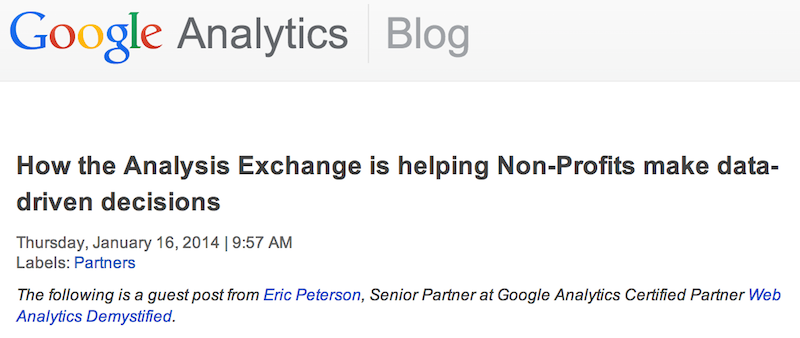
Yes, those are followed links. The first goes to Eric Peterson’s Twitter profile and the second goes to his site.
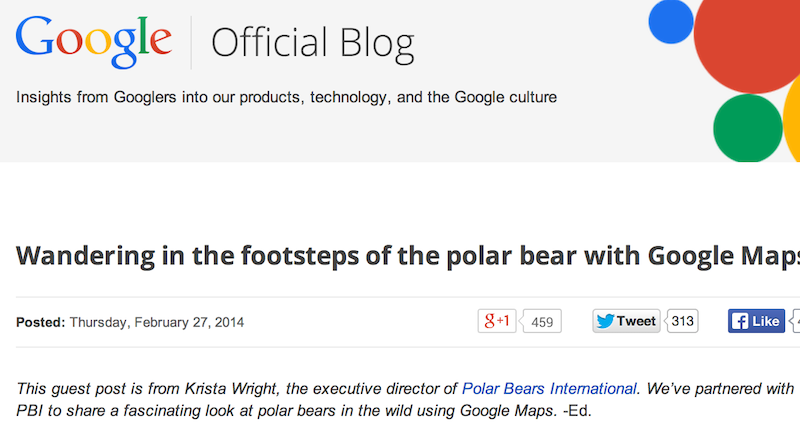
Another followed link. This one is brand anchored.
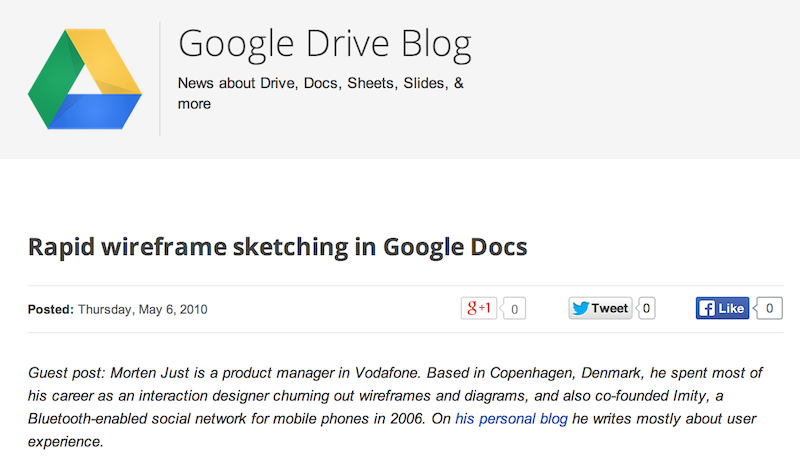
OK. A followed link to Morten Just's personal blog. I'm pretty sure "his personal blog" is not a phrase he is trying to rank for. But still, the PageRank that flows from the Google Drive Blog was probably appreciated.
The Official Google Search Blog:
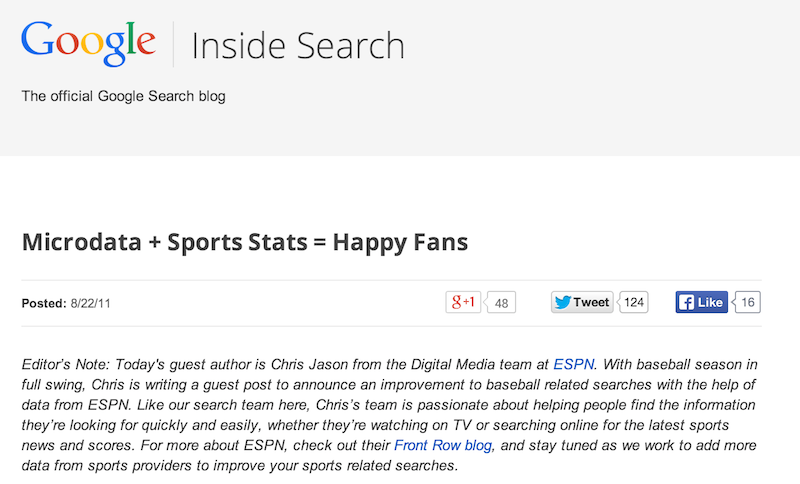
I guess ESPN was trying to build some brand awareness? It was nice of Google to mention their blog as well.
There are many, many more examples. So, if Google allows guest posting and grants followed links, then surely this must mean that obtaining some links from guest posts is ok?
Matt made a statement in his article saying that some multi-author blogs may be alright to guest post in:
I’m also not talking about multi-author blogs. High-quality multi-author blogs like Boing Boing have been around since the beginning of the web, and they can be compelling, wonderful, and useful.”
I believe that the Moz site probably would be considered one of these “high quality multi-author blogs. In fact, on the Moz site, they published an email discussion that took place between Moz employee Jen Lopez and Matt Cutts:
Jen Lopez: Hey Matt,
I made the mistake of emailing you while you weren't answering outside emails for 30 days. 😀 I wanted to bring this up again though because we have a question going on in Q&A right now about the topic. People are worried that they can't guest post on Moz: http://moz.com/community/q/could-posting-on-youmoz-get-your-penalized-for-guest-blogging because they'll get penalized. I was curious if you'd like to jump in and respond? Or give your thoughts on the topic?
Thanks!
Matt Cutts: Hey, the short answer is that if a site A links to spammy sites, that can affect site A's reputation. That shouldn't be a shock--I think we've talked about the hazards of linking to bad neighborhoods for a decade or so.
That said, with the specific instance of Moz.com, for the most part it's an example of a site that does good due diligence, so on average Moz.com is linking to non-problematic sites. If Moz were to lower its quality standards then that could eventually affect Moz's reputation.
The factors that make things safer are the commonsense things you'd expect, e.g. adding a nofollow will eliminate the linking issue completely. Short of that, keyword rich anchortext is higher risk than navigational anchortext like a person or site's name, and so on."
There are some HUGE clues in this email conversation:
- If you link to spammy sites then that can negatively affect your reputation.
- It is important to do make good editorial decisions about the links that you publish.
- Keyword rich links from guest blogs are much worse than linking with your name, brand or url.
So, if Moz is generally considered a site that does good due diligence in regards to editing, then why on earth was a site given a link from YouMoz as an example link? (If you don’t know, YouMoz is the section where you can submit a guest post for publication. Moz gets a large number of guest post submissions and makes an editorial choice as to which ones they want to publish.) To answer this question, let’s look at the nature of the link. When Rand wrote his article stating that links from YouMoz were not unnatural, he commented on the link that was anchored with “Photographers SEO community”:

His point that this was not a term that was being used to manipulate Google and really should have been a valid link. But, I’m not sure if Rand was aware that the original article had an author bio that looked like this:

Did you notice the link that is anchored with “New Jersey Photographer”? This is definitely a link that was made with the intention of improving the site’s rankings for its main keyword. Also, let’s look at the backlink profile of the site. According to the Majestic SEO historical index there were as many as 59 domains linking to the site with the anchor text “New Jersey Photographer”. It is quite obvious that the site owner was creating links in order to manipulate their Google ranking. The site did not get an unnatural links penalty because they guest posted on Moz. But rather, the penalty came because there was a history of repeatedly creating links with the sole intention of passing PageRank to their site and improving their rankings. When the webspam team member gave them three example links, my guess is that they had determined that guest post links were a problem, and then they randomly chose the Moz link as a keyword anchored guest post link example.
I do know that Moz goes through a fairly strict editorial process. The link here is in the author’s bio box. I believe it’s possible that the author changed their bio to include a keyword anchored link after the post was published. Who knows. My point is that this example does not mean that all guest post links from Moz are bad. It was the pattern of repeated unnatural linking that got them the penalty, not the link from Moz.
Can you see the difference between this YouMoz Guest post and the ones published on the Google blogs listed above? The latter is definitely one that was created with the sole intention of improving their rankings for a particular keyword. Also, the site had a history of creating a large number of these links.
Guidelines for Guest Posting in 2014 and beyond
If you ask a Google employee whether you can guest post and include a followed link, most likely the answer is going to be that it’s not a good idea and just to be safe you should nofollow the links. But, we can clearly see that Matt Cutts says that there are some instances where having a followed link in a guest post is acceptable. And, Google itself is still publishing guest posts with followed links on their own blogs. With this in mind, here are my recommendations in regards to guest posting:
- Ask yourself, “Would I still be putting extensive effort into writing this guest post if I could only get a nofollowed link from it?” In other words, does the guest post truly, honestly bring you brand awareness and potentially qualified traffic?
- Avoid linking back with keyword rich anchor text. I don’t believe all unnatural links have keyword anchors. But, if you are making the link yourself and you’re linking with a keyword that you’re trying to rank for on Google, this doesn’t look good.
- Are the only links your site is getting from guest posts? If so, I believe it’s possible that this could be a signal to Google that your guest posting is primarily so that you can improve your site’s ranking. John Mueller has mentioned in a few hangouts that if, for example, all of your links consist of one type such as footer links , then things are starting to look unnatural.
- Does this site appear to have good editorial control over their guest posts? Take a look at some of the other guest posts being published. If it appears that anyone can get a guest post published then that’s not a good sign. Similarly, if the site is commonly linking out to completely unrelated sites or has a lot of links out to “bad neighbourhoods” such as pharma sites, payday loans and gambling sites then I’d stay away.
- Check out the site’s “about us” or “advertising” page. If there is emphasis on the fact that you get a followed link, or that the site has high PageRank, this is not a good sign.
Conclusions
Does this mean that we should all run out and start finding the best sites to guest blog on? No, of course not. My point is that it appears that both Matt Cutts and Google are saying that some truly authoritative, relevant and helpful guest blogging might be acceptable in Google’s eyes. If you’re using guest posting primarily as a way to gain links, then you’re doing it wrong and at risk for a penalty. If you have a bunch of keyword anchored guest post links pointing to your site, you may want to consider removing or disavowing those links before Penguin refreshes again. But, if your guest posting links are honestly made to bring you good traffic, exposure and brand awareness then I believe it is ok to take the occasional guest posting opportunity.
I will still continue to guest blog for Moz and Search Engine Watch and I will continue to insert the odd link to my site where I feel that the link is one that is helpful for readers.
How about you? Will you still guest blog? Or do you think that all guest posting is unnatural in Google’s eyes?



Comments
Great article Marie
I feel when Google took down article directories people switched to “guest blogging” and it became the new article marketing under a different name.
I can understand why Google are trying to make it clear they aren’t stupid and it’s not an acceptable practice to publish articles just for links no matter what it’s called.
I think they have a tough job because when they talk they’re talking to the masses, and the masses aren’t capable of producing quality content that will feature on an authoritative site so guest blogging is out the window for them all together.
I agree Murray. I think guest posting used to be legit and then people pushed the envelope too far. I can see the thought progression of some people from “This is a good authoritative and related site that will bring me traffic” to “This is a not bad site and it’ll probably bring me traffic” to “Well…it’s not a great site and it probably won’t bring me traffic but how will Google know” and suddenly we’re littering the web with guest posts for links.
Hi Marie,
Thanks for explaining this. When Matt’s “Stick a Fork in It” post first came out, there was a lot of confusion. No one was certain as to what is acceptable, and what isn’t. Your post goes a long way towards clearing things up.
I know that some sites are so afraid that they’ve made every link a no-follow link.
What do you think of that approach? If it became the norm that almost all links are no-follow, and followed links are reserved for very rare situations, would that be a positive thing? What sort of impact would that have on the internet?
I get frustrated when I see sites that are nofollowing every outbound link. That is not what nofollow was created for. But, the problem is that Google is so unclear on what is and isn’t acceptable that so many people are afraid that *anything* could get them penalized. The thing that most people don’t realize is that link penalties and Penguin were designed to demote sites that are really, obviously, overtly cheating. If you’ve got a friend with a site and you link to that friend that’s not going to get you penalized. Similarly, if you like a site and want to recommend it then that’s what a followed link is for!
I don’t think there will be a huge effect on the internet from people nofollowing all of their links because I think it’s probably a small proportion of the population that is doing this.
Nice job clarifying these guest posting misconceptions, and there are a lot of them that have been kicked up since Matt’s post. It seems like Matt wants to say guest posting is ok for those doing it for the right reasons — traffic, brand awareness, increasing your authority — but the practice has been so abused of late he doesn’t dare give the spammers anything to latch onto. Its a shame because when used for the right reasons its a very valuable tool.
Also, nice find on the old bio box on the YouMoz article BTW.
I’m very intrigued to see what fallout there is on guest posts with the new Penguin update. To date, most of what I’ve seen concerning this is on the manual action side.
Thanks Mark. I have a theory that the next Penguin update will hit rampant guest posters hard and that perhaps this is why it is taking so long to refresh Penguin as they don’t want to hit anyone unfairly.
http://freelancing-stories.com
All misunderstandings had been all answered. It’s really clear to me. Thanks for this article. Wouldn’t you mind share this to my friends, too? They are also confused with this topic.